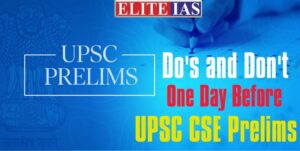In order to find applicants for various positions in organisations like the Indian Administrative Service (IAS), Indian Foreign Service (IFS), Indian Police Service (IPS), Indian Revenue Service (IRS), and others, the Union Public Service Commission (UPSC) holds the Civil Services Exam each year. One of India’s most difficult competitive exams is the civil services test. Therefore, you must be persistent and diligent if you want to work in the civil service. You should keep yourself current on global events.
You must read periodicals that will increase your intelligence and skill. Gaining proficiency will be facilitated by practise with sample test questions. Regarding whether you should or should not get coaching, Civil Services applicants have repeatedly shown that this is a personal decision. Without any coaching, a number of candidates for the Civil Services have passed the exam in one sitting. They had the self-assurance, drive, perseverance, and resolve to make it happen.
First Understand UPSC Exam Pattern
The Civil Services Examination comprises:
- Civil Service Aptitude Test (CSAT)
- Civil Services Main Examination
- Personality Test
2 papers make up the Civil Service Aptitude Test. A maximum of 200 points are awarded for each paper. These are objective-type questions. The curriculum covers topics including national and international current events, Indian history, geography, economic and social development, environmental ecology in general, general science, logical reasoning and analytical ability, and English language comprehension.
Public Services Nine papers make up the main examination. The papers are all of the descriptive variety. These essays are meant to gauge the candidates’ general intellectual prowess and depth of knowledge.
The purpose of the personality test is to evaluate a candidate’s personality in terms of their intelligence, skills, qualities, and values.
Need for Coaching for the Civil Services Exam
Many candidates who start their Civils preparation are unaware of the requirements of this test, and the majority cannot simply afford to travel to Delhi and attend coaching.
Regarding whether to enroll in Civil Services coaching, there are many misunderstandings and uncertainties. So let me simplify things for you. The civil service exam is not as difficult to pass as has been made out to be. Any intellectually average individual can pass this exam with ease. There is a catch, though. Yes, passing UPSC examinations is doable, but it’s crucial to focus your efforts in the appropriate direction if you want to succeed.
Otherwise, pointless attempts are useless. Taking coaching, in the opinion of experts and IAS faculty, is a good idea because it will help you focus your efforts in the proper direction. In particular, UPSC hopefuls who will be taking these exams for the first time should enroll in coaching because it would help them get off to a good start.
Advantages of Coaching for Civil Services Examination
- Attending a coaching centre allows you to meet with like-minded individuals, comprehend their perspectives, learn from their learning preferences, increase your knowledge, and stay up to date on the most recent developments.
- Your motivation levels will remain high due to the competitive environment. Faculty suggestions will enable students to learn more in a condensed amount of time. You can increase your quickness and your capacity for dealing with various types of inquiries by taking the examinations they routinely administer.
- On the other hand, if you are putting it together independently, you have the luxury of studying whenever it is convenient for you. Your planning can be done in accordance with your priorities. By traveling less between your home, college, and coaching facilities, you can save time. You can save money by studying alone, but coaching is necessary for thorough and effective civil service preparation.
- With the aid of mentors who have years of experience in what they are doing, you may plan and prepare. For this reason, an institute performed a research-based study that found that students who receive the right coaching and supervision have a better probability of passing the civil service exam than those who did their own independent study.
- There are instances when what we read and what we understand may not match up. We must receive the appropriate direction for this, which is crucial. Coachings are important because they impart education in the right style and context. Without sufficient direction, we interpret and believe what is true.
- Of all the tests offered in India, the civil service exam is one of the most dynamic. Therefore, it is imperative that you stay current with the latest adjustments to the syllabus, exam format, and other relevant areas.
- Coaching organizations are not managed by laypeople; instead, they employ subject-matter experts to provide you with the best advice and recommendations.
- Normally, the commission’s official website posts the most recent modifications, but you can only learn about changes in time and their effects if you talk to someone about them. This can only be accomplished through group conversation, and the best places to discover like-minded individuals are coachings.
Conclusion
The civil service exam is not one that can be easily passed by studying for a few hours by yourself in the comfort of your home. Students must work on their whole personalities in this exam in order to get the designation that demands the highest level of knowledge and wisdom. This cannot be created alone at home. Students must leave their homes and travel to coaching in order to cognitively, psychologically, and physically prepare for this difficult exam. The conclusion is so obvious: coachings are crucial for passing the civil service tests, even if there is no formal or legal need.
FAQs
Q 1. Who requires coaching sessions?
The people who are unable to comprehend the UPSC syllabus, nature, and exam pattern, is the correct response. the candidate who is unaware of the nature, format, etc. of the exam. someone who is incapable of learning in a self-disciplined manner.
2. Who needs coaching classes, and why?
Answer. To study properly and with discipline, coaching is essential. When one is unsure of how to begin preparing, it is necessary. coaching while receiving professional advice and insights.
3. How crucial is coaching?
One of the most commonly posed questions is this one. Over the years, UPSC has altered its pattern frequently to make civil services exam preparation available to and feasible for candidates from a variety of backgrounds. Its goal is to counteract coaching’s influence and put all applicants on an equal footing. The majority of successful applicants have, however, received coaching at some stage throughout their preparation.
Q.4 How can coaching assist candidates in integrating their Mains and Preliminary exam preparation?
In-depth comprehension is provided by integrated preparation, in response. The preparation follows the same rules. It is important to comprehend the topic in its entirety. Only then, with a focus on the orientation, could the prerequisite for the Preliminary and Mains be satisfied. Preliminary exams are oriented at a combination of factual knowledge and understanding, with a preference for the former.
Q 5. How useful is the Test Series for practicing?
Answer: Very helpful because we experience an environment similar to an exam room and doing well develops our mental faculties. Because we follow the test series timetable and complete the entire curriculum, we can assess our self-preparation through the test series. We are also inspired to perform well under duress by the Test Series. When we perform well on a test series, our confidence increases and it motivates us to work hard.
Q 6. How can I study for the UPSC exam if I’m working?
The nature of your employment will be significant, and you’ll need to adjust to your routine. Time management also becomes crucial because quality study overtakes quantity every time. Weekly goals should be made in order to prevent boredom. When the weekly goal is reached, confidence will also rise. Utilize the weekend wisely, go over the reading you did during the week, and evaluate your readiness by taking the tests. Smart pressure management techniques include reading selectively, revising what you read, and practicing your writing.


